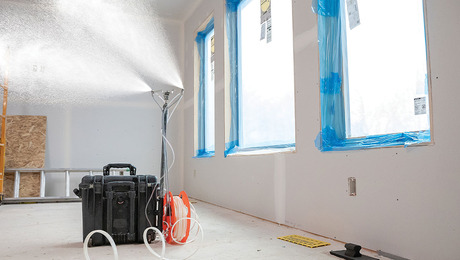We’ve all heard stories about contractors who get paid, but fail to show up for the job or fail to complete it once they start, leaving their clients in the lurch. But the door swings both ways, and especially in this economy, you’re probably as likely to hear about a homeowner failing to pay a contractor as you are the other way around. So, what should you do if a paying customer becomes a non-paying customer? The video shows how one builder from the U.K. decided to settle a debt (but, we wouldn’t recommend this solution).
Update: Thanks for your comments to date, everyone-especially CindyTR for the link. Looks like our angry builder’s original “demo” video made the news. Click the link to get the back story and see an interview with the builder who called his actions both “satisfying” and “gut-wrenching.”
Here are a few things we would recommend, however, and they may just help you avoid a customer-relations problem to begin with:
- Protect yourself with a rock-solid contract
- Don’t rely on a handshake; document everything
- Use a common-sense approach to keeping jobs on track
- Know the risks and plan for them
Browse our special “Guide to Business” for more practical tips from pros.



























View Comments
How does this help resolve the contractor's predicament? The work is done and the material can't be returned to the supplier, so unless you've left out an important part of the story, this is just a shock video of an pitiful guy destroying any professional reputation he may have had (not to mention wiping out the possibility of an eventual return on the work he has done!). Does this thug expect potential clients will overlook such outbursts of emotional instability???
Personally, I would sooner give away my work than destroy it over a bill.
I am embarrassed by and for this guy. He clearly needs counseling.
I would agree with BBen. However, I must admit on my 1st job as a contractor back in 1973, I furnished a custom made steel threshold at the entrance to a shopping center storefront. The owner did not pay, so I took back the threshold (it was detachable and did not require any destruction or demolition). This is not remotely comparable to the contractor in the video, and I would probably do it again in a non-payment situation.
The alternatives suggested in your story are common industry tips, but none of them assure payment to a contractor.
I have been in the business 36 years. I have always used rock solid contracts, never done business on a handshake, always meticulously planned, scheduled and documented my projects, provided full-time on-site supervision, completed the work on time and on budget, and have always understood the inherent risks and priced the work accordingly.
Unfortunately, there are no air-tight guarantees that you will always be paid (either partially or in full)for your work. When a customer refuses to pay you are left only with legal recourse, and as anyone who has been in business for many years can tell you, even in this instance your chances of recovery remain sketchy at best.
Sad but true. It comes with the turf. When you are in business, you have chosen to accept risk. Payment is one kind of risk.
I would, however, offer one addition to your list of alternatives to further assure the likelihood of payment, and I would place it at the top of that list. Know your customer. Good business takes place between/among good people.Do your best to know the person you will be working for, and don't be afraid to ask pointed questions about how they intend to pay.
If a lender is involved, talk with them directly and have them issue a written confirmation addressed to you stating that the funds are in place for the project you will be doing and for the contract amount you have provided. There are additonal steps to take when a lender is involved, but this is a simplified bare minimum starting point.
If a lender is not involved, you must assure yourself that you are dealing with a trustworthy individual. This can be ascertained through research and references, just as an owner would do similar research for a prospective contractor.
I have also been in business for nearly forty years, and I can relate to what the guy is doing in the video. The problem is, of course, that he is breaking the law, which is rather one sided in these matters. The materials that you provide in the construction process, once fitted, become the property owners property. So if you destroy them, you are guilty of criminal damage.
So now the contractor has two problems, or should I say three. He has the original one of non payment, plus he now has a criminal record to go with it. Further, he will almost certainly be told by a judge to reinstate the building.
Here comes the fourth problem: He will now have to pay for the reinstatement! Then he can start to sue for reimbursement for the original contract. Then there is another problem: The homeowner can now sue for damages, and so it will go on.
If the builder wants to open an account with a merchant to purchase the materials to do the job, that merchant would require all sorts of references and limits on how much he can get. So the same should apply when the builder does a job for someone. If the potential customer has a problem with answering your searching questions, then potentially you will have a problem with getting paid. So walk away, is the simple answer. Personally, I always get some money up front, as a good will gesture, even if I know the person. After all, trust has to be on both sides.
The truth is, I don't believe the video was a non payment issue anyway. I think that the guy is working on his own house, and has had the planners on his back over something, and been told to take the porch down. But that is just my guess. Although, you would have expected him to move his own car, so I might be wrong.
Looks like he did a tidy job though, both up and down.
This, tried and true, method has been in use in the Detroit area for years. As a result; the demolition isn't usually necessary. There's an understanding that transcends that.
Backtracking the video leads to the original article in the Mirror. This is in the UK and things are *very* different there, "common" language notwithstanding. In fact, from the article:
"And Anita, who refused to comment, still faces a big bill - because she must pay for the rubble to be removed from her council house in Shoreham, East Sussex. The county council said: 'Tenants are allowed to make improvements to homes. But Mrs Dovey will be billed the cost of returning the property to its original state.'"
Way back when a man I used to work for doing barn repair work was the craziest person I ever knew. There wasn't any repair or fix he would not try to do. Many years later, AFTER I left his employ he told me one day, that he had repaired storm damage on a local farmers barn roof and the farmer was not satisfied with the work. Big surprise there. At any rate after many refusals of payment, this guy's solution was to go over there late one night and burn the place down which he did. I never saw him again nor wanted to and always thought somebody would shoot him one day. He died of lung cancer many years ago.
Here we go. The Mirror loves shock, SkyNews is a bit more reliable:
http://www.youtube.com/watch?v=J-LqLU7CxeA
This one actually talks to the contractor.
This truly is illegal, and I doubt that it is an actual contractor doing that. If it is, he is not very smart. Some have already mentioned how many more problems this creates for him. The contractor's only recourse is to file a lean on the property and sue the owner.
I am not a contractor. On the other hand, we recently built a large home which we contracted out ourselves. Everything went well except the electrical. The contractor we hired to do the work put in the service while we were negotiating the rest of the contract (my BIG mistake). He would never agree to reasonable terms, so I decided to find someone else. He sent me a bill which was about 5 times usual and customary charge for the work he did. I had three other contractors bid the job, and also give me estimates for the work the first contractor did. I took the average of their estimates for his work and sent him a check stating "paid in full." He called me. He said I have to send him the full amount or he was coming over and ripping out everything he put in. I said "no you aren't." I called the police, who called him about his threat to break the law. He clearly had the option of ripping up the check and suing me for the full amount. He chose to cash the check and I have never spoken with him since. He turned out to not be so dumb after all.
The contractor who built my house 6 years ago here in Portland, OR told me a story about his framer, a hippie throwback. A former general contractor refused to pay this framer at the completion of a job, so the framer drove his truck through the newly framed house and kept on going. The house was completely destroyed. The general contractor was so nervous about what he might do if he reported him that he paid him in full and never reported it. But as satisfying as this is to hear about, and on one level appeals to our innate sense of justice, this is not the best way to handle disputes in life. If we all handled things this way, many more bad things could happen. BTW - my first thought as I watched this video was that this was a planned demo of a little front porch, removing it to build an intended proper front porch that would actually protect guests as they waited for the owner made his/her way to the front door.
I knew a well driller years ago that would guarntee a viable well, but when he was done he wanted his momey, but if you wouldn't pay he would brick up the casing; he never got caught, but everone knew. To the day he died he had plenty of customers and he always got his money.
People got to realize that the small contractor works on a tight shoestring and the ones that won't pay usually have a smirk on their faces. POWER TO THE CONTRACTORS!!
we had an interesting situation a few years ago.
a customer called to have some door damage repairs done to her house, by a drug addled grandson trying to break in.
she had retired from DPBR here in florida and we gave her a quote which was accepted and my guys replaced the destroyed doors.
as they were leaving, she asked my lead-man to look at a leaking skylight, he saw no problem but put a bead of caulk around it.
she filed a complaint the next day for our doing "roofing" without a roofing license and of course she refused to pay the bill.
crooks come in all shapes & sizes, it took 2 years to resolve the complaint & we never got out money.
it seems the grandson didn't fall far from the tree.
I contracted in a large city for over 20 years.I only lost 100
dollars,and that was my fault.The woman was a widow and I felt sorry for her.
My contract was simple:50% up front....25% when the job was half done and then the balance when I was finished the job.
Anyone that didn't sign the contract and put up a deposit I told them to get someone else.I never had anyone refuse to sign!
BBen......if you did a 50thousand dollar job....50% of that is material.Are you gonna give it away?????
Now admittedly I've never gone over and ripped out work but I have threatened to do it.
There was a builder way back in the 50's that took a lot of his sub trades for a ton of money.He took my Dad for over 50.000 dollars!!!!!
I couldn't get over my Dad paying the bill (to his suppler)
out of his own pocket!!
Makes you glad they've changed the law.These guys that operate a million dollar limited company with a 5000 dollar
liability.
Anyway I laugh when I read the stories about some poor schmuck that got taken by a contractor......but you never hear about the other way around!!
Matrix man; My company does not subscribe to the contractors response but can sympathise on how difficult collections can be, that said you shouldn’t comment on a story you don't know. Had you watched the actual news report http://www.youtube.com/watch?v=J-LqLU7CxeA, you would discover that the action was sanctioned by the local government. Furthermore, your account of how you paid off your contractor was in reaction to a fee you felt should be lower. Having even 20 estimates done after the fact is completely incredulous because the assessments can only be made on what is obvious and no hidden detail work can be accounted for by those making the assessments. Even assuming your contractor were a crook, your haloed response to your contractor is completely uninformed as is your comment on the video.
Savont
Cert building contractor
Cert electrician
Cert plumber
Cert carpenter
In California (yes, California) the contractor would be committing a felony if the value of the addition was over $600. Once anything is permanently attached to real property, it is part of the real property, and cannot be removed by the contractor for non-payment. The only recourse a contractor has is to lien the job.
I never asked for a deposit up front when I got a job. The customer gains a bit more confidence in my status and it gives me an edge over the guy who showed up in his Levis and wanted 10% down before he started the job.
BTW, in California, a contractor can only require 10% of the job price or $1,000 whichever is LESS.
Many years ago I knew a "Wiseguy" contractor in Chicago who had a unique way of dealing with situations like this.He would simply say he needs to adjust the door before he's finished and would proceed to walk away with the door.Not very nice, but effective....
The tenant of the house contracted the work with the permission of the owner of the house, the local government. Following “quicquid plantatur solo, solo cedit” -- once it is affixed, it belongs to the owner of the land. In this case that was the local government, who gave him permission to demolish.
The work involved the porch and a "conservatory" (attached sunroom). The sunroom was disassembled, and later sold.
So aside from catharsis he also got a portion of his materials cost back, and quite a lot of press.
Over 20 years ago I was known as the go-to guy in the area for high-end decks. A builder who did very nice work but had his share of setbacks had me build a deck with a chinese-chippendale-style railing on his house, overlooking the 15th fairway of a very private country club. The fancy railing was an extra. When I finished, I asked for the last draw on the deck and payment for the railing in full. The usual song and dance ensued, followed by unreturned phone calls, etc. The call that worked is paraphrased here: "Nick, I take it you are aware the Belmont club championship is this weekend, and there will be hundreds of members walking the course, most of whom know you. Unless you want to explain why your deck is in the middle of the 15th fairway, where I will happily tow it, I'd suggest you have my payment by this evening." He paid. Sometimes ya gotta do what ya gotta do...
Over 20 years ago I was known as the go-to guy in the area for high-end decks. A builder who did very nice work but had his share of setbacks had me build a deck with a chinese-chippendale-style railing on his house, overlooking the 15th fairway of a very private country club. The fancy railing was an extra. When I finished, I asked for the last draw on the deck and payment for the railing in full. The usual song and dance ensued, followed by unreturned phone calls, etc. The call that worked is paraphrased here: "Nick, I take it you are aware the Belmont club championship is this weekend, and there will be hundreds of members walking the course, most of whom know you. Unless you want to explain why your deck is in the middle of the 15th fairway, where I will happily tow it, I'd suggest you have my payment by this evening." He paid. Sometimes ya gotta do what ya gotta do...
Deck and fence company owner for over 20 years and now the founder of:
http://www.randyslist.com
Reached all 50 states in 32 days!